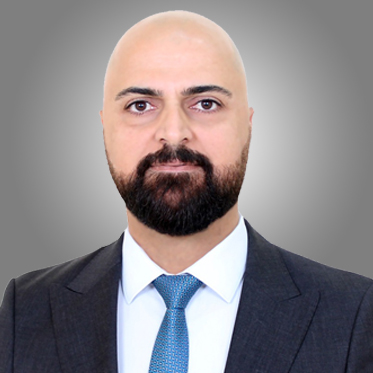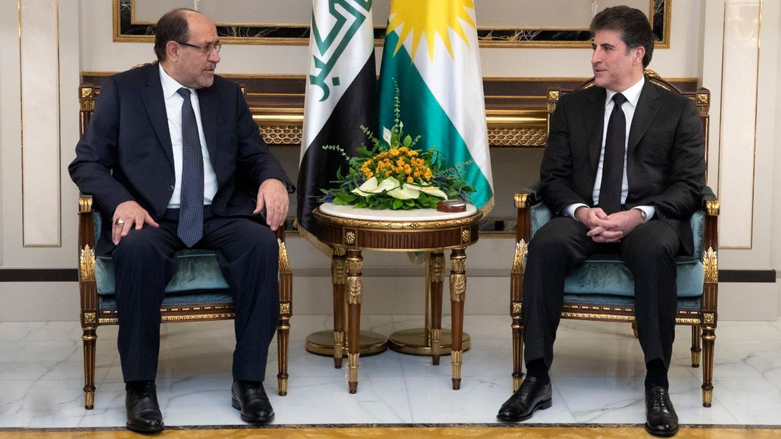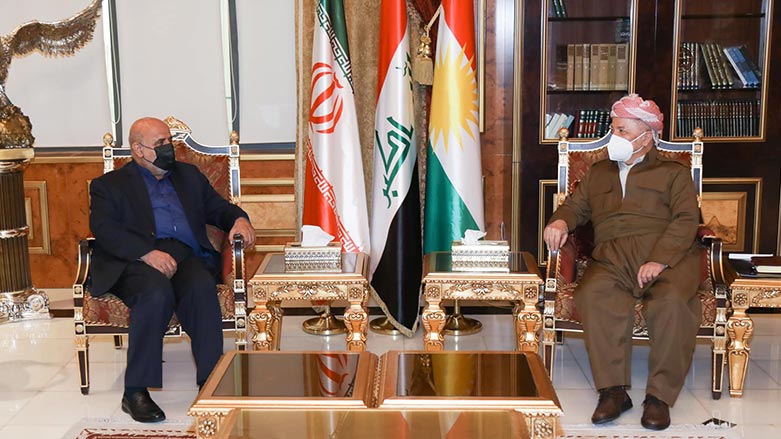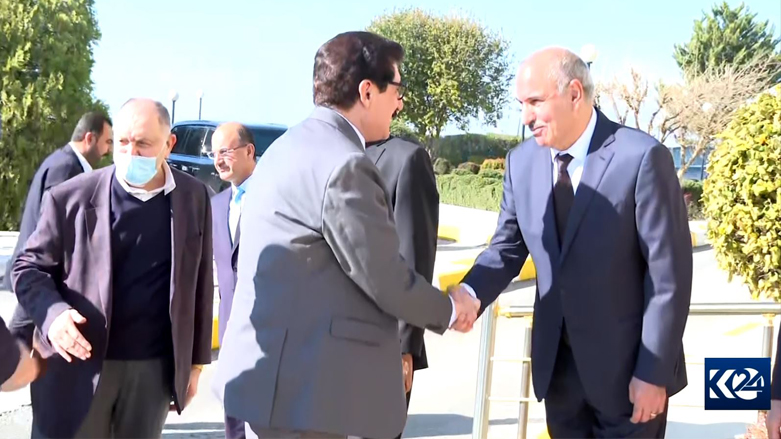USIP, KRG foreign relations sign MoU on bilateral ties
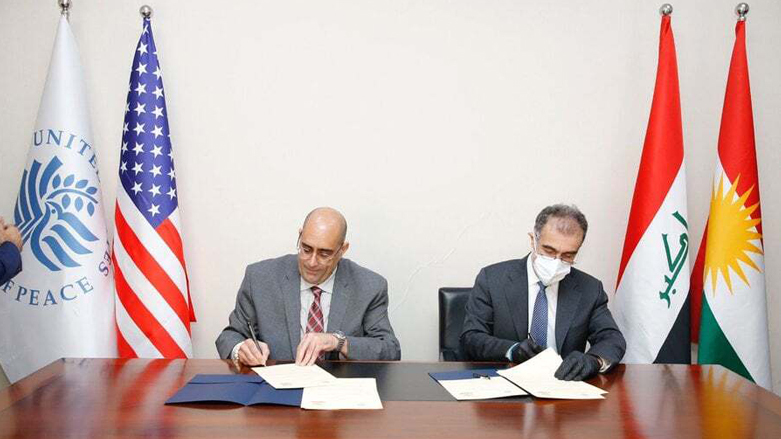
ERBIL (Kurdistan 24) – The United States Institute of Peace (USIP) and the Kurdistan Regional Government’s (KRG) Department of Foreign Relations (DFR) signed a memorandum of understanding (MoU) on Tuesday.
Dr. Elie Abouaoun, USIP’s Director of Middle East and North Africa Programs, and Safeen Dizayee, Head of KRG’s Department of Foreign Relations, signed a memorandum of understanding on Tuesday that provides a framework for all relations between USIP and the KRG.
“Through strategic and technical assistance, USIP supports the Kurdistan Regional Government, including in the implementation of UN Security Council Resolution (1325) on Women, Peace, and Security,” Abouaoun told Kurdistan 24 on Wednesday.
“My pleasure to receive Dr. @elie022 Director MENA Programs at @USIP & sign MoU for extension of their mission in KRI,” Dizyaee tweeted. “We had an excellent exchange of views on promoting inter-religious & political dialogue, advocating for peace and confidence building measures within communities.”
My pleasure to receive Dr. @elie022 Director MENA Programs at @USIP & sign MoU for extension of their mission in KRI. We had an excellent exchange of views on promoting inter-religious & political dialogue, advocating for peace and confidence building measures within communities. pic.twitter.com/XjODzE7XbI
— Safeen Dizayee (@SafeenDizayee) October 5, 2021
Abouaoun told Kurdistan 24 that the USIP and its partners have helped mend sectarian and inter-tribal divides in communities torn apart by extremist violence, including the Iraqi districts of Mahmoudiyah, Tikrit, Hawija, Hamdaniyah, Yathrib, and Tal Afar.
“We are currently leading a dialogue in Northern Sinjar,” Abouaoun said. “Together with our partners, our work has halted violent feuds, saving lives and re-stabilizing communities.”
Through a specialized tool called the Conflict and Stabilization Monitoring Framework, the USIP collects data directly from conflict-affected communities in minority-rich areas to understand barriers to peace and stabilization needs.
“USIP supports a locally driven research and training initiative in Anbar and Basra, two provinces where tribal dynamics dominate, to address the drivers of community-based conflicts, mitigate violence, and strengthen stabilization efforts through facilitated dialogues,” Abouaoun said.
“This initiative also explores how broadening tribal practices might promote peace and help strengthen state institutions.”
Regarding the Strategic Framework Agreement between the United States and Iraq, through which US agreed to end its combat mission in Iraq by Dec. 31, 2021, Abouaoun said that the complex premise that led the U.S. to end its combat mission makes a reversal of the decision quite inconceivable.
“At this stage, the US is determined to maintain its ‘train and advise’ mission, and will therefore provide the necessary protection for this mission to operate safely,” he said. “If this becomes a mission impossible, the easiest way forward is to withdraw the mission rather than change its nature to a combat one”
“On another hand, the protection of this kind of missions is not only achieved through military means,” he added. “The U.S diplomacy plays an important role in this case, and can negotiate, directly or indirectly, some sort of rules of engagement with the armed actors in Iraq.”
Regarding the most urgent problems that the next Iraqi government, after October elections, should deal with first, Dr. Abouaoun told Kurdistan 24 that security sector reform and law enforcement come as top priorities.
“The confusion about who does what amongst the security actors, the criminal intrusiveness of some armed groups, the lack of accountability, the weak law enforcement and an undermined rule of law are major challenges to an overdue healing and recovery roadmap,” he said. “Without having these fixed, it will be very hard for the incoming government to crack down on corruption, provide basic services, encourage the return of IDPs, address the local drivers of the terrorist resurgence, plan and implement an economic recovery plan, including attracting more investment, and Iraq will remain a theatre for cross border military actions by neighboring countries.”
Any step in the direction of strengthening local governance, according to Dr. Abouaoun’s perspective, is an important milestone. That is because several examples from around the world show that decentralized governance structures can deliver better services to their constituencies.
Dr. Abouaoun described Kurdistan Region Prime Minister Masrour Barzani’s decision to make Ankawa a district as one step in the right direction.
“From a purely governance angle, I think the decision is one step in the right direction, and in the specific case of Ankawa, there is one additional ‘political’ angle; given that Ankawa is mostly inhabited by Christians, the change of status from a suburb to a district will create a positive momentum whereby the Ankawans feel more ownership about their geography and role.” Abouaoun said.
Regarding his expectation about the upcoming Iraqi elections, Abouaoun said that he doesn’t see any indications that there will be major changes in the power dynamics of the elected parliament.
“The problem in Iraq is that politics has become so monopolized by a well-defined establishment to the extent that one can predict the result of an election ahead of time,” he said.
He sees no indication that there will be “major changes in the power dynamics of the elected parliament.”
“Therefore, I don’t see how the outcome of October 10 popular consultation will lead to significant changes in how the prime minister, Speaker and President of the Republic are (s)elected for example, nor do I see how a parliament that is composed to large extent of the same political formations will be able to tackle the deep-rooted problems that the country suffers from,” he said.
“My expectations from next week’s elections are therefore very modest.”
Despite the changes made to the electoral law, Abouaoun also doesn’t expect to see many candidates who are not supported by the mainstream parties to win. “The obstacles preventing fair electoral competition are not only legal,” he said. “There are other political and security related factors that would impede non-affiliated candidates from competing with well-resourced electoral bulldozers.”
The Kurdistan Democratic Party (KDP) will most likely gain more votes than any other Kurdish party in the election.
“I am not an election expert, and therefore cannot predict how many seats any given party might get,” Abouaoun said. “However, every indication at this stage shows that the KDP will get more than any other Kurdish party.”
The United States Institute of Peace is a national, nonpartisan, independent institute, founded by the US Congress. USIP has continuously worked in Iraq, and the Kurdistan Region, since 2003. Its initiatives aim to strengthen institutions and communities’ capacity to prevent, mitigate, and resolve conflicts without violence.
